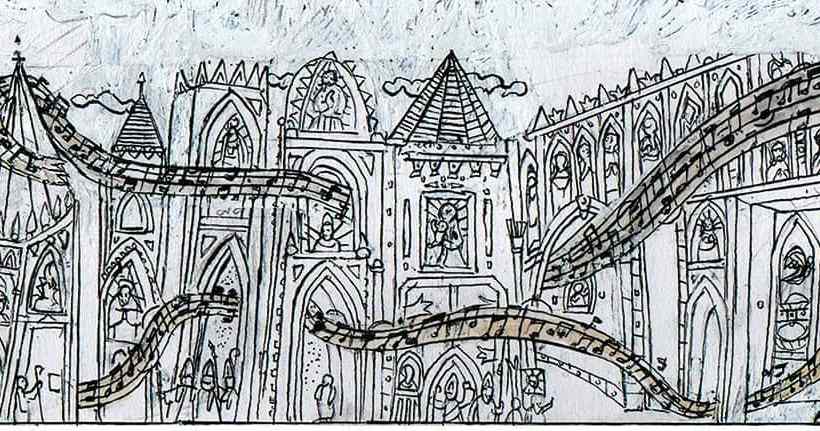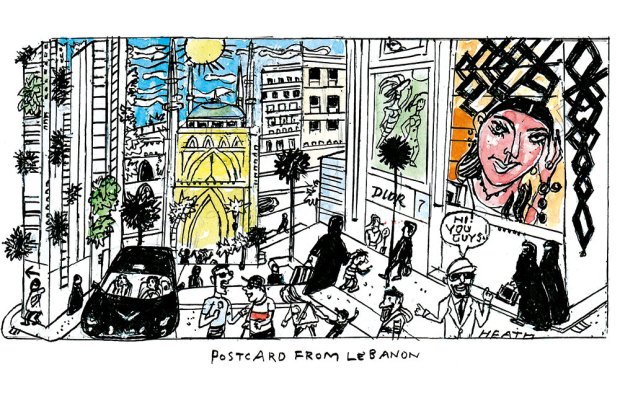There were two world premieres during the Queen’s funeral on Monday. One was a beautiful setting of some verses from Psalm 42 by Judith Weir, the Master of the King’s Music, and the other was an anthem by me, a setting of a passage from Romans 8, ‘Who Shall Separate Us From The Love of Christ?’ I wonder if Judith had to deal with some of the questions I got on the day. How could I have written the music so fast considering that Her Majesty only died on 8 September? Of course, these things are planned years in advance, so I composed the anthem some time ago. I was asked to keep quiet about it until Sunday night when the order of service was published. I was told that this passage from Romans 8 was important to the Queen, as it gets right to the heart of her relationship with Jesus. Her Christian faith was an inspiration to millions, perhaps billions, around the world, and her ability to communicate it with devotion and pastoral insight in her Christmas messages and on other occasions was the focus of significance in her life and example. I have rarely reflected so deeply on a text, both while I was setting it and in the years since.
The Queen was a central presence throughout my whole life and in the lives of countless others for many years. Her quiet devotion to this country, this people, this Commonwealth, was the deciding factor for many people in their realisation of just how creative our constitutional monarchy is. I believe that it nurtures a true and profound democracy, perhaps the most successful, the most efficient and the most humane the world has ever seen.
The first time I met the Queen was at the 75th birthday party of the great Russian cellist Mstislav Rostropovich, which was held, astonishingly, at Buckingham Palace in 2002. Before dinner there was a short concert given by the London Symphony Orchestra, conducted by Seiji Ozawa. After this, the assembled guests mingled with the royal family and members of the orchestra. I knew many of them and got lost in musical conversation just as the dinner guests were being ushered towards their tables, a memo which I clearly missed. Then the orchestral players were ushered out in the opposite direction and I found myself marooned in the reception hall with the royals and their puzzled staff, who stared at me wondering who on earth I was. Before anything else could happen two large doors opened and I could see the assembled guests at their tables (where I should have been), all standing to attention as the royal family walked in. The only thing I could do was to join on at the end of this distinguished line, the servants glaring at me as I channelled my inner Mr Bean. I eventually got to my table where my fellow guests stared open-jawed at me. They included the Polish composer Krzysztof Penderecki, Dmitri Shostakovich’s widow and Prince Michael of Kent. The place next to me was set for the Rt Hon the Baroness Thatcher, but she didn’t turn up.
In the hours before the Queen’s funeral, my grown-up children, via our WhatsApp group, were keeping me up to speed with views expressed on Twitter by some of the Scottish Nationalist/socialist/separatist fraternity who, strangely, seemed less than impressed that the two commissions for new music at the funeral had gone to two Scottish composers. Judith Weir is a compatriot, but we’re the Wrong Kind of Scots – or that’s what they’ve told me, anyway, over the years. One patriot tweeted angrily that I ‘have to move back to England’ because I’m ‘not a Scottish citizen’. Some others were annoyed at the title of my anthem ‘Who Shall Separate Us?’ implying that this contained some dastardly hidden Unionist code designed to mess with Scottish brains. They seemed unaware that St Paul’s Letter to the Romans was short on advice on Scottish constitutional rearrangements.
It was a great honour to write this funeral anthem, knowing as I did that it would be sung by the choirs of Westminster Abbey and His Majesty’s Chapel Royal, St James’s Palace, and conducted by James O’Donnell. My publishers Boosey & Hawkes are expediting its release so other choirs can get hold of it. Is it difficult to sing? Well, it’s unaccompanied, of course, and that takes great skill for any choir, amateur and professional alike. It divides into seven and eight parts, so the choir must be big enough and confident enough to handle all those different layers. One of the greatest joys in my composing life is setting the word Alleluia. I never tire of it, and it can be done in so many ways. This anthem culminates in a series of ecstatic Alleluias, the eight vocal lines rippling up and down before settling to a serene Amen. It was my way of expressing joy at the gift of the Queen’s life with us these past 96 years.
Got something to add? Join the discussion and comment below.
Get 10 issues for just $10
Subscribe to The Spectator Australia today for the next 10 magazine issues, plus full online access, for just $10.
You might disagree with half of it, but you’ll enjoy reading all of it. Try your first month for free, then just $2 a week for the remainder of your first year.














Comments
Don't miss out
Join the conversation with other Spectator Australia readers. Subscribe to leave a comment.
SUBSCRIBEAlready a subscriber? Log in